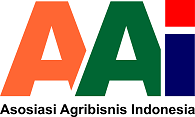- Focus and Scope
- Section Policies
- Peer Review Process
- Publication Frequency
- Open Access Policy
- Archiving
- Publication Ethics
- Indexing
- Article Processing Charge (APCs)
- History
Focus and Scope
The aims of this journal is to provide a venue for academicians, researchers and practitioners for publishing the original research articles or review articles. The scope of the articles published in this journal deal with a broad range of topics, including:
Agribusiness, which involves the comprehensive examination of agricultural production, distribution, and marketing processes. This interdisciplinary field integrates agriculture with various industries, such as food processing, packaging, distribution, and retail sales. It entails the intricate coordination among multiple entities to facilitate the movement of agricultural products from farms to end consumers.
Agricultural Economics, a discipline that applies economic principles to analyze and address challenges within the agricultural sector. This field encompasses a wide range of subjects, including farm management, resource allocation, market structures, policy analysis, and rural development. Through the examination of the economic dynamics of agriculture, agricultural economists seek to understand factors influencing market behaviors, such as supply and demand dynamics, price fluctuations, and trade policies.
Agribusiness Management and Analysis, which focuses on the strategic planning, organization, and optimization of agricultural enterprises within the broader agribusiness context. It entails the application of managerial principles, financial analysis, and market research techniques to enhance the efficiency and profitability of agricultural operations.
Agricultural Communication and Counseling, which involves the strategic dissemination of information and the provision of guidance to stakeholders within the agricultural sector. This field employs various communication channels, including written, oral, and digital platforms, to convey agricultural knowledge, best practices, and research findings to farmers, policymakers, consumers, and other relevant audiences.
Institutional Agriculture, referring to agricultural systems and practices that are significantly influenced by formal organizations, government policies, and institutional frameworks. These institutions encompass government agencies, agricultural cooperatives, research institutions, and international organizations, which play pivotal roles in shaping the rules, regulations, and support systems governing agricultural production and trade.
Regional Economics, examines patterns of production, consumption, investment, and trade within specific geographical regions. This discipline aims to identify opportunities for economic growth, assess disparities in income and wealth distribution, and formulate strategies for fostering economic resilience and competitiveness at the regional level.
Regional and Development Planning, a comprehensive process involving the assessment of a region's current status, identification of development goals and priorities, and formulation of strategies and policies to achieve sustainable growth and enhance the quality of life for its inhabitants.
Resources and Environmental Economics, a field that investigates the intricate interplay between human activities, natural resources, and the environment from an economic standpoint. It delves into understanding how economic decisions influence the utilization, management, and conservation of natural resources such as water, land, minerals, and forests, as well as the repercussions of these activities on ecosystems and environmental integrity.
Section Policies
Articles
Peer Review Process
Peer Review Process
Publication of articles in Jambura Agribusiness Journal is dependent solely on scientific validity and coherence as judged by our editors and/or peer reviewers, who will also assess whether the writing is comprehensible and whether the work represents a useful contribution to the field. Jambura Agribusiness Journal acknowledged the effort and suggestions made by its reviewers.
Initial Evaluation of Manuscripts
The Editor will first evaluate all manuscripts submitted. Although rare, yet it is entirely feasible for an exceptional manuscript to be accepted at this stage. Those rejected at this stage are insufficiently original, have serious scientific flaws, or are outside the aims and scope of the Jambura Agribusiness Journal. Those that meet the minimum criteria are passed on to experts for review.
Type of Peer Review
Submitted manuscripts will generally be reviewed by two to three experts who will be asked to evaluate whether the manuscript is scientifically sound and coherent, whether it duplicates the already published works, and whether or not the manuscript is sufficiently clear for publication. The method is double blind peer review.
Decision
Reviewers advise the editor, who is responsible for the final decision to accept or reject the article. The Editors will reach a decision based on these reports and, where necessary, they will consult with members of the Editorial Board. Editorial board decision is final.
Publication Frequency
Jambura Agribusiness Journal is issued every year, namely in January-June and July-December.
Open Access Policy
This journal provides immediate open access to its content on the principle that making research freely available to the public supports a greater global exchange of knowledge.
Archiving
This journal utilizes the LOCKSS system to create a distributed archiving system among participating libraries and permits those libraries to create permanent archives of the journal for purposes of preservation and restoration. More...
Publication Ethics
Jambura Agribusiness Journal publishes articles in agribusiness fields such as Agribusiness, Agriculture Economic, Agribusiness Management and Analysis, Agricultural Communication and Counseling, Institutional Agriculture, Regional Economics, and Regional Development and Planning issues. For a peer-reviewed journal, the publication of articles plays an essential role in the development of a coherent network of knowledge. It is, therefore, essential that all publishers, editors, authors, and reviewers, in the process of publishing the journals, conduct themselves in accordance with the highest level of professional ethics and standards. We follow the Committee on Publication Ethics (COPE)'s Code of Conduct for Journal Publishers.
Ethical Guideline for Journal Publication.
The publisher is dedicated to supporting the vast efforts of the editors, the academic contributions of authors, and the respected volunteer work undertaken by reviewers. The publisher is also responsible for ensuring that the publication system works smoothly, and that ethical guidelines are applied to assist the editor, author, and reviewer in performing their ethical duties.
Duties of Author
All the work reported in the manuscript must be original and free from any kind of plagiarism.
The work should not have been published elsewhere or submitted to any other journal(s) at the time of submission to Bentham Open.
Any potential conflict of interest must be clearly acknowledged.
Proper acknowledgments to other work referred/cited (of any individual, company or institution) must be given. Permission must be obtained for any content used from other sources.
Only those who have made any substantial contribution to the interpretation or composition of the submitted work should be listed as Authors. While other contributors should be mentioned as co-authors.
Duties of Editor
The editor of a journal holds a vital position taking important editorial decisions on all peer-reviewed articles submitted for publication.
The editor should maintain the transparency of the academic research and record, preclude professional needs from cooperating with ethical standards, and always be willing to publish retractions, rectifications, and erratum when required.
The editor should assess manuscripts for their scientific quality and intellectual content, free from any biased decisions based on discrimination of race, gender, geographical origin, or religion of the author(s). The editor should evaluate manuscripts objectively based on their academic merit and free of any commercial or self-interests.
The editor should not disclose any information regarding submitted manuscripts before publication of the said manuscript.
Promoting research rectitude must be preserved. If at any stage the publisher suspects any kind of misconduct in research, it should be investigated promptly and in detail with suitable authority. Furthermore, if any suspicious activity is observed in the peer review, it should be resolved with diligence.
Duties of Reviewers
Providing a detailed, constructive, and unbiased evaluation in a timely manner on the scientific content of the work.
Indicating whether the writing is relevant, concise, and clear and evaluating the originality as well as scientific accuracy.
Maintaining the confidentiality of the complete review process.
Notifying the journal editor about any financial or personal conflict of interest and declining to review the manuscript when a possibility of such a conflict exists.
Notifying the journal editor of any ethical concerns in their evaluation of submitted manuscripts such as any violation of ethical treatment of animal and/or human subjects or any considerable similarity between a previously published article and any reviewed manuscript.
Duties of Publisher
The editor should acknowledge receipt of submitted manuscripts within two working days of receipt and ensure an efficient, fair, and timely review process.
The editor should ensure that submitted manuscripts are processed in a confidential manner, and that no content of the manuscripts will be disclosed to anyone other than the corresponding author, reviewers, and the publisher, as appropriate.
The editor should recuse himself or herself from processing manuscripts if he or she has any conflict of interest with any of the authors or institutions related to the manuscripts.
The editor should not disclose the names and other details of the reviewers to a third party without the permission of the reviewers.
The editor has the right to make the final decision on whether to accept or reject a manuscript with reference to the significance, originality, and clarity of the manuscript and its relevance to the journal.
The editor should by no means make any effort to oblige the authors to cite his or her journal either as an implied or explicit condition of accepting their manuscripts for publication.
The editor should not use for his or her own research any part of any data or work reported in submitted and as yet unpublished articles.
The editor should respond promptly and take reasonable measures when an ethical complaint occurs concerning a submitted manuscript or a published paper, and the editor should immediately contact and consult with the author. In this case, a written formal retraction or correction may also be required.
=======================
Editor in Chief,
Jambura Agribusiness Journal
Indexing
Articles published in Jambura Agribusiness Journal (P-ISSN: 2685-5860, E-ISSN: 2685-5771) have appeared in the following indexes:
- Science and Technology Index (SINTA)
- Google Scholar
- Crossref
- GARUDA (Garda Rujukan Digital)
- PKP Index
- ICI World (Index Copernicus International)
- BASE (Bielefeld Academic Search Engine)
- WorldCat
- Dimensions
- CiteFactor
- DRJI (Directory of Research Journals Indexing)
- EZB (Electronic Journals Library)
- International Journal Impact Factor
- EuroPub
Article Processing Charge (APCs)
This journal charges the following author fees.
Article Submission: 0.00 (IDR)
Article Publication: 1,500,000.00 (IDR)
If this paper is accepted for publication, you will be asked to pay an Article Publication Fee to cover:
- DOI activation for each paper.
- Article similarity checking by Turnitin.
- Layout Editing according to journal publishing standards.
History
Starting from Volume 3 Issue 2, the Editorial Board of Jambura Agribusiness Journal has added article DOI information to each article header. Each accepted article is subject to a publishing fee of 500,000.00 (IDR).
From Volume 4 Issue 1, accepted articles are in English for our publication.
From Volume 4 Issue 2, the final article template was adjusted again to improve the quality and information of our Journal.
Since March 2025, JAJ has upgraded its accreditation ranking to second accreditation rank (Sinta-2).
Starting in 2025, If an article is accepted for publication, this journal charges 1,500,000.00 (IDR) for the article with the Indonesian first author to cover publication costs. For non-Indonesian first authors, no author fees are needed.

























